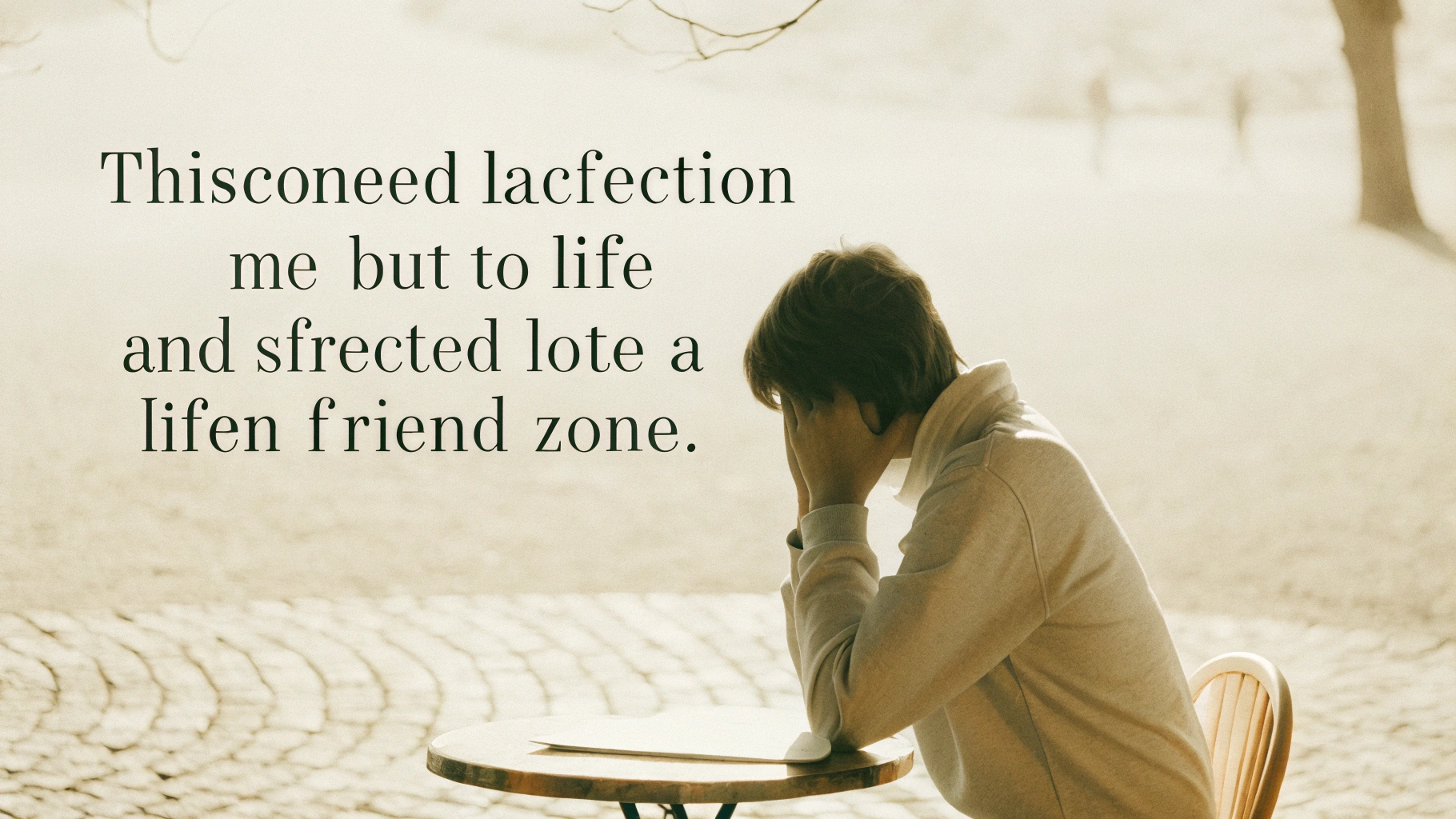Overview
The friend zone describes a relational condition where one person has romantic feelings for another who does not share those feelings. This often leads to emotional complexities and frustration. Over half of daters encounter this situation, with many citing:
- Lack of physical attraction
- Poor conversational flow
These insights highlight the nuanced dynamics of emotional connections and suggest that friendships can evolve into romantic relationships.
Introduction
Understanding the nuances of the friend zone is essential in today's complex relational landscape. Here, romantic feelings often clash with platonic intentions. This phenomenon is experienced by many, yet few fully comprehend it. It reveals the intricate dynamics of emotional connections and their impact on self-worth.
What happens when affection is unreciprocated? How can individuals navigate the emotional turmoil that accompanies such situations? Exploring the origins, social implications, and psychological characteristics of the friend zone offers valuable insights. These insights can transform potential heartache into opportunities for growth and deeper connections.
Define the Friend Zone: Understanding Its Meaning
The friend zone meaning refers to a relational condition where one person has romantic or sexual feelings for another, but those feelings are not reciprocated. This often occurs in friendships where one individual seeks a deeper connection, while the other prefers to keep things platonic. The term has gained popularity in culture, frequently linked to feelings of frustration and unrequited love. Understanding the friend zone meaning is essential for navigating modern dating, as this concept underscores the complexities of emotional connections and expectations.
Real-life experiences illustrate the common nature of this companionship barrier. Studies show that over half (53%) of daters have found themselves in this situation, with women more likely to initiate it (62% of single females compared to 40% of men). A significant 71% of participants cite a lack of physical attraction as the primary reason for being placed in the friend zone, while 32% point to poor conversational flow as another factor. These statistics reveal that many people face companionship dilemmas, often leading to feelings of frustration and desire.
Psychologists emphasize the emotional complexities of the friend zone meaning, noting that it can evoke feelings of unreturned affection and isolation. The platonic space is often likened to a waiting area in dating, where patience may yield rewards or disappointments. Dating expert Kate Taylor suggests that being friend-zoned can also foster lasting friendships, offering a silver lining to the experience. Furthermore, 77% of individuals believe it is possible to change their feelings about someone in a platonic context, promoting a more optimistic perspective on these dynamics. Understanding these intricacies can empower individuals to manage their emotions and relationships more effectively, encouraging personal growth and resilience in the face of unreciprocated affection.
Contextualize the Friend Zone: Social Dynamics and Emotional Implications
The relational sphere is a complex social framework shaped by power dynamics and personal investments that significantly affect interpersonal connections. Individuals in platonic situations often grapple with feelings of rejection, frustration, and confusion, particularly when their romantic feelings go unnoticed or unreturned. This emotional turmoil can diminish self-esteem, impacting not just their current emotional state but also their future relationships. Research shows that the quality of relationships is crucial for self-esteem growth; thus, being categorized as a companion can have lasting effects on a person's self-worth.
Societal narratives frequently depict the companionship area as a negative space, reinforcing stereotypes about gender roles and expectations in romantic pursuits. For instance, studies reveal that approximately 68% of couples indicate their romantic relationships began as friendships, highlighting the importance of intimacy and trust in developing deeper connections. This suggests that while the companionship boundary may initially appear limiting, it can also serve as a foundation for meaningful relationships when approached with openness and patience.
Understanding these dynamics is vital for fostering healthier relationships and enhancing communication. By recognizing the emotional aspects of the friend zone meaning, individuals can manage their feelings more effectively, thereby nurturing connections based on mutual respect and understanding. This awareness can ultimately lead to more fulfilling relationships, whether they remain platonic or evolve into something more romantic.

Trace the Origins of the Friend Zone: Historical and Cultural Perspectives
The friend zone meaning gained popularity in the 1990s, particularly through its use in the television series 'Friends.' In the episode 'The One with the Blackout,' the character Joey describes a scenario where romantic feelings aren't reciprocated. This concept has since woven itself into popular culture, appearing in films, TV shows, and social media.
Unreciprocated affection reflects broader societal views on companionship and romance, showing how cultural narratives shape personal experiences and expectations in relationships. Sociologists like Morgan Anderson, PsyD, highlight that 'the companionship classification is fundamentally a method to describe a relationship that eliminates romantic intent,' which underscores the intricacies of these dynamics.
Recognizing the term's origins can clarify its meaning and foster deeper conversations about emotional connections. Moreover, understanding the complex emotions tied to social interactions can help individuals navigate their feelings with clarity and respect.
Practical strategies for moving from friendship to romance, as illustrated in the case study 'Navigating the Friend Zone,' offer valuable insights into the friend zone meaning for those looking to redefine their relationships.

Analyze the Characteristics of the Friend Zone: Psychological and Behavioral Insights
People in social circles often exhibit specific psychological and behavioral traits. A common thread is the tendency to idealize another person, leading to heightened personal investment despite a lack of reciprocation. This idealization often arises from a deep desire for connection, which can make it difficult for individuals to accept their reality. Research shows that 68% of participants reported that their most recent or current romantic relationship started as a friendship, underscoring the potential for relationships to develop over time.
Moreover, those who experience the friend zone meaning frequently face challenges with assertiveness; they may worry that expressing their feelings could threaten the existing friendship. This dynamic can create a cycle of relational limbo, where one person clings to the hope of a romantic shift, illustrating the friend zone meaning, while the other remains unaware or uninterested. As Willard Marsh wisely advises, 'Choose compatibility over mere sparks,' emphasizing the importance of recognizing the effects of unreciprocated love.
Understanding these dynamics is essential for individuals navigating their emotions, as it promotes self-awareness and encourages open communication. Recognizing the emotional distress tied to unrequited love can empower individuals to establish healthy boundaries, ultimately leading to more fulfilling relationships, whether platonic or romantic. A case study revealing that 82% of couples who prioritized companionship were not initially romantically attracted to one another further reinforces the idea that attraction can evolve over time, highlighting the complexities of relationship experiences.
Explore the Impact of the Friend Zone on Relationships: Consequences and Coping Strategies
The companionship boundary can significantly impact both individuals involved and their wider social networks. Feelings of rejection and frustration can lead to resentment, jeopardizing existing friendships. To navigate the friend zone effectively, individuals might consider several strategies:
- Self-Reflection: Taking time to understand personal feelings and motivations can clarify one's emotional state and aid in making informed decisions about the relationship.
- Open Communication: Candidly discussing feelings with the other person can alleviate misunderstandings and set clear expectations, fostering a healthier dynamic.
- Establishing Boundaries: Setting limits can protect personal well-being and prevent further complications in the friendship.
- Seeking Support: Connecting with friends or professionals can provide valuable perspectives and comfort, helping individuals process their experiences.
Research indicates that friendships are crucial for resilience, and maintaining these connections can be beneficial during challenging times. For example, a study revealed that individuals with strong social ties are 50% more likely to thrive emotionally and physically. Moreover, humor can act as a coping mechanism, enabling individuals to navigate the complexities of unreciprocated feelings with a lighter heart.
Ultimately, understanding the friend zone meaning empowers individuals to approach their relationships with greater clarity and confidence. This understanding can transform potential emotional turmoil into opportunities for personal growth and deeper connections.

Conclusion
The concept of the friend zone represents a complex emotional landscape where romantic feelings are often unreciprocated, leading to frustration and confusion. This dynamic highlights the intricate nature of human connections, underscoring the need to understand and manage emotional expectations in friendships and potential romantic pursuits.
As we explore the friend zone, we uncover key insights about its prevalence in modern relationships, the psychological implications of unreciprocated affection, and the historical context that has shaped its cultural significance. Many individuals navigate this challenging terrain, with a significant portion of relationships starting as friendships, illustrating the potential for deeper connections to evolve over time.
Understanding the emotional intricacies tied to the friend zone empowers individuals to approach their relationships with greater awareness and resilience. By fostering open communication, setting boundaries, and engaging in self-reflection, one can transform the experience of unreciprocated feelings into opportunities for personal growth and stronger connections. Embracing the complexities of the friend zone not only enhances interpersonal dynamics but also contributes to a deeper understanding of oneself and others in the realm of relationships.
Frequently Asked Questions
What does the term "friend zone" mean?
The friend zone refers to a relational condition where one person has romantic or sexual feelings for another, but those feelings are not reciprocated. It often occurs in friendships where one individual seeks a deeper connection while the other prefers to keep things platonic.
How common is it for people to find themselves in the friend zone?
Studies show that over half (53%) of daters have found themselves in the friend zone, with women more likely to initiate it (62% of single females compared to 40% of men).
What are the primary reasons for being placed in the friend zone?
A significant 71% of participants cite a lack of physical attraction as the primary reason for being placed in the friend zone, while 32% point to poor conversational flow as another factor.
What emotional effects can the friend zone have on individuals?
The friend zone can evoke feelings of unreturned affection and isolation, potentially diminishing self-esteem and impacting future relationships.
Can friendships develop from being in the friend zone?
Yes, dating expert Kate Taylor suggests that being friend-zoned can foster lasting friendships, offering a positive outcome from the experience.
Is it possible for feelings to change in a platonic relationship?
Yes, 77% of individuals believe it is possible to change their feelings about someone in a platonic context, promoting a more optimistic perspective on these dynamics.
How do societal narratives impact perceptions of the friend zone?
Societal narratives often depict the friend zone as a negative space, reinforcing stereotypes about gender roles and expectations in romantic pursuits. However, approximately 68% of couples indicate their romantic relationships began as friendships, highlighting the potential for deeper connections.
What is the importance of understanding the friend zone dynamics?
Understanding the dynamics of the friend zone is vital for fostering healthier relationships and enhancing communication. By recognizing the emotional aspects, individuals can manage their feelings more effectively, leading to more fulfilling relationships, whether platonic or romantic.




